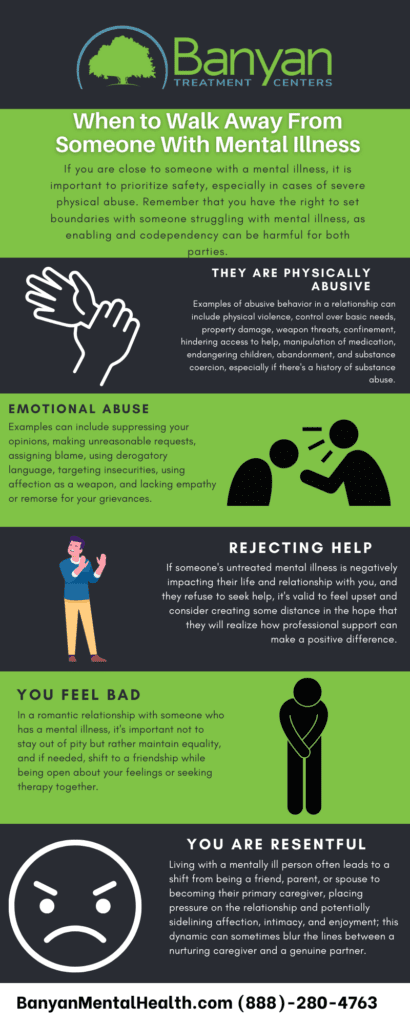


Stephen ‘tWITCH’ Boss’s Death & High-Functioning Depression
January 18, 2023

How To Stop Trauma Dumping
March 2, 2023When to Walk Away From Someone With Mental Illness


Loving someone with a mental illness requires a great deal of patience, compassion, understanding, and willingness to recognize that, sometimes, you are going to be giving more than you get. But sometimes, the giver hits the point where they have nothing left to offer. What then? If you have got a loved one with a mental health disorder, you may be constantly encouraged to never give up on them, but what about you? If you are currently going through this internal struggle, below are signs that can indicate when to walk away from someone with a mental illness that might help make things clear.
Mental Illness and Relationships
Whether it is a friend, parent, wife, or husband with mental illness problems, loving someone who struggles with their mental well-being can be difficult. Especially if you have never personally had a similar experience, it can be challenging to relate to how this individual is feeling and therefore empathize.
What’s more, mental illness is often easy to conceal early in a relationship. In some cases, the individual is high-functioning and can temporarily keep a rein on their symptoms, especially in a new relationship. The person they are dating may not even realize they have a mental illness or understand how that illness may affect the relationship over time.
Unfortunately, especially in romantic relationships, the individual whose spouse is mentally ill will experience physical, emotional, or financial abuse. While this is not to say that mental illness makes a person abusive in any way, in many cases – especially in those where the individual doesn’t want to get professional treatment – challenges like abuse are more likely to occur.
While loving someone means you are choosing to support the individual through their struggles and accept their mental illness, you also must remember that you are not responsible for the individual’s condition. Ultimately, only that person can choose whether they want to seek help and learn how to properly cope with their symptoms and be accountable for their actions. Recognizing can further clarify when to walk away from someone with mental illness.
Giving Up On Someone With Mental Illness: When It’s Okay


Just because someone is mentally ill does not mean they have all rights to your time, attention, or care. Unfortunately, in some cases, people will use their mental health disorders to take advantage of others. Enabling and codependency are also common in relationships with mentally ill people, which can be unhealthy for all parties involved.
Whether you decide to permanently cut ties with this person or take some time away from them, below are signs of when to walk away from someone with mental illness.
They are Emotionally, Mentally, or Physically Abusive
Mental illness can make it difficult for someone to effectively manage a situation without being hurtful to the other person. Especially in cases when the mentally ill individual does not want to get professional help, the risk of abuse is higher. Not getting help from a mental health facility also makes it less likely that they will realize the error in their ways and how they are hurting their loved ones.
As much as you might love or care for the individual, if they are emotionally, mentally, or physically abusive, it is okay to step away from the situation. Some examples of emotional, mental, and physical abuse include:
Emotional & Mental Abuse:
- Being dissatisfied, no matter how hard you try or how much you give
- Criticizing you for not completing tasks how they want them done
- Demanding you spend all your time together
- Demanding you to name exact dates and times when discussing things that upset you as proof (and when you cannot do this, they may dismiss the incident as if it never happened)
- Expecting you to put everything aside to meet their needs
- Expecting you to share their opinions (i.e., you are not permitted to have a different opinion)
- Making unreasonable demands
- Blaming you when anything goes wrong
- Name-calling and using abusive language when speaking to you
- Poking fun at your insecurities or finding ways to humiliate you
- Withholding affection to punish you when they do not get their way
- Your cries, complaints, and concerns are not enough to produce any apology or remorse from them
Physical Abuse:
- Pulling your hair, punching, slapping, kicking, biting, or choking you
- Forbidding you from eating or sleeping
- Damaging your property when they are angry (throwing objects, punching walls, kicking doors, etc.)
- Using weapons to threaten to hurt you or themselves, or hurting you or themselves with weapons
- Trapping you in your home or keeping you from leaving
- Preventing you from calling the police or seeking medical attention
- Withholding prescriptions or hormones
- Harming your children
- Abandoning you in unfamiliar places
- Driving recklessly or dangerously when you are in the car with them
- Forcing you to use drugs or alcohol (especially if you have had a substance abuse problem in the past)
While the individual’s diagnosis may make it difficult for them to cope with certain situations or cause certain symptoms that may fall into any of the aforementioned categories, there is no excuse for abuse. While you do not have to permanently leave the individual if they do abuse you, it is safest for you and/or your children to be physically away from them. At a distance, you can safely help them find the mental health treatment and support they need to get better.
They Don’t Want to Seek Help Despite the Harm
If the individual’s mental illness is disrupting their quality of life as well as the quality of their relationship with you, yet they refuse to get help, it is understandable to be upset about it. Especially if their mental illness causes them to mistreat you, themselves, or others, getting anxiety or depression treatment is crucial for sustaining their well-being and relationships. If they have been abusive or hurtful towards you and do not want to seek mental health treatment to learn how to properly cope with their symptoms, it is okay to take a step back in hopes that they will realize how professional support can help.
You Feel Bad for Them
Particularly if you are in a romantic relationship with someone who is mentally ill, you do not want to stay in a romantic relationship with them simply because you feel bad for them. Their disorder does not mean they should be pitied, as individuals with mental illness are perfectly capable of doing extraordinary things.
Pitying them can be a sign that you no longer see them as equal partners but as someone inferior and who needs to be cared for. This can gradually bleed into the realm of enabling and codependent behavior if you are not careful.
Instead, you can remain in their life as a friend, but be honest with them about how you are feeling. If you are worried about how it may affect them, encourage them to go to family or couples therapy with you to talk things out.
You Are Resentful, and It Shows
Let’s face it, living with a mentally ill person can be downright difficult. In many cases, a loved one takes on the role of the person’s main caregiver, which can be a lot of pressure. What tends to happen is that the person’s role as the individual’s friend, parent, or spouse shifts to a caregiver, which puts other qualities of the relationship, like affection, intimacy, and having fun, on the back burner. The individual with the mental illness may also become overly dependent on their caregiver, which can make the relationship seem more like that of a nurse and their patient rather than a friendship or marriage.
It is common for people who are caring for a mentally ill loved one to become frustrated with being the caretaker. Oftentimes, when these feelings are unresolved, it can lead to a lot of resentment. If you find yourself resenting or seeing them as a burden, then it may be time to look for other caregiving accommodations for them and take a step back so you can remember how your relationship should be.
Finding a Mental Health Rehab Near Me
If you or someone you care about is struggling with mental health, do not wait to get help. Our facilities for mental health offer outpatient and residential programs to address disorders like depression, anxiety, OCD, and more. Through evidence-based therapy, we have supported thousands of clients in their pursuit of long-term recovery.







